Ever since I committed to the seemingly impossible task of fitting this enormous trip to Dublin into less than twenty-four days, the passage from Tbilisi to Istanbul had always perplexed me. Unlike other long-distance parts of the trip, no train connected the two places directly. Since taking a taxi or hitchhiking wasn’t practical given the distance that separated the cities, a bus ride was clearly the most realistic overland option. But the bus tickets were often unavailable for days, and booking in advance was a luxury I couldn’t afford as I hadn’t even known when I could reach Tbilisi. In addition, the prospect of traveling 1700km (1050 mi) on a single bus ride was a bit daunting. Sleeper buses with beds didn’t seem to be a thing, and splitting the trip into easier pieces wasn’t an option because there was not enough time.
Having wrestled with these conundrums, I felt such a relief when I arrived at the Tbilisi central bus station and saw an actual bus bearing the destination Istanbul on its front windshield. The bus was standing there in an unkempt lower ground of the station with its door and the trunk wide open, as if to take a deep breath of the crisp morning air. All around, the station and its surroundings seemed to have been frozen in time from the past. The poorly lit storefronts and the crumbling sidewalks had clearly not changed since Soviet times. Inside the station, there was only a cold and harsh emptiness enclosed by weathered concrete walls and windows. The emptiness felt so deliberate that there was little room for anything extra. Only the feeble glow of the naked and flickering lightbulbs struggled to fill the void, reflecting off the empty shops and the concrete floors that, despite being well swept, couldn’t hide the wear of time. Many places bore Russian-language signs advertising departures to cities such as Vladikavkaz and Krasnodar. Passengers were having a smoke in front of marshrutkas, awaiting their long ride across the Caucasus mountains. Standing in the middle of that stasis of time, the gleaming and modern exterior of the bus looked like a historical anomaly.
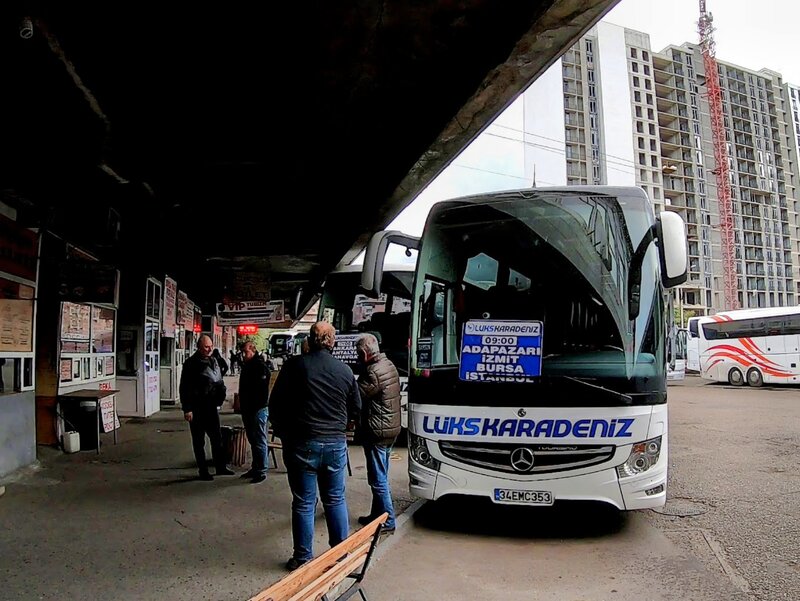
When the bus departed at 9:00AM, it was pretty much empty. The only passengers besides me were three Georgian girls who happened to be hardcore enough to be going all the way to Istanbul. The empty seats suggested that, for some reason, sitting on a bus for thirty hours wasn’t exactly a popular means of traveling to Istanbul from there. The bus drove through the familiar riverside streets I had walked yesterday, and eventually escaped Tbilisi and entering the rural highway.
Dotted settlements and anonymous townships occasionally came and went in the languid scenery outside the window, but in the distance there were always mountains. In the Georgian countryside, the mountains never ended, and they were more than just towering masses of earth and rocks. When the sunlight was just at the right angle, their complex terrain sculpted by time emerged. The smooth curves flowed all the way down from their peaks, forming winding valleys and ridges. The green highlands etched with wavy crumples of earth couldn’t look more peaceful. But the peace didn’t last long. Soon, clouds covered the entire sky, and the mountains turned into distant black masses gazing back at me with no expression. Their presence was just as callous and disheartening as the nightly Caspian Sea once appeared from the height of Baku.
Just as the mountains couldn’t get any darker and the sky cloudier, it started drizzling. The bus continued westward along the wet highways and through the cities. Whenever it stopped for a break, the attendant would announce how much time we had in Georgian. Since getting stranded in the middle of a highway was the last thing I wanted, I had to keep asking her in Russian, “Skol’ko minut u nas est?” (“How many minutes do we have?”) More passengers boarded from the rain-soaked towns along the route. Among those sitting near me was a grandma who, noticing my inability to understand Georgian, translated whatever the attendant was saying into English. “You’ve got ten minutes,” she would explain to me when the bus stopped for a rest. I wondered how she was able to speak English so well. But I didn’t get a chance to ask as she was sitting a few rows back. “Thank you, spasibo,” I would simply reply in an awkward mixture of languages, not knowing which one she preferred.
In the afternoon, the bus finally kissed the western edge of Georgia and met the vast expanse of the Black Sea. The rain had picked up the intensity and the churning body of the sea lashed onshore with an increasing fury. The bus rode alongside the angry sea for an hour until reaching Batumi where more passengers boarded. The aging structures of the seaside villas and restaurants looked as bleak as the gray waves that continued to crash on the nearby shoreline below. But as we approached the Turkish border, a glimpse of sunlight appeared through the thick clouds. The bright silver linings gradually punctured a small part of the gray sky and lit up the far side of the sea. A tiny patch of distant water gleamed so brightly in the unexpected beams of sunlight piercing the overcast sky. At that moment, the rain had let up and I could see the horizons on the far side of the Black Sea. The gray water, once enraged, now only gently tapped the coastline and looked more green than gray. With raindrops slowly rolling down its windows, the bus silently carried on. When we arrived at the border moments later, all passengers were told to leave the bus to go through customs. “You need to take your stuff,” the grandma behind me said as I stood around not knowing whether to take my bag. With a backpack awkwardly one-strapped on my shoulder and both hands full of plastic bags filled with snacks and electronics, I hurried toward the border crossing station.
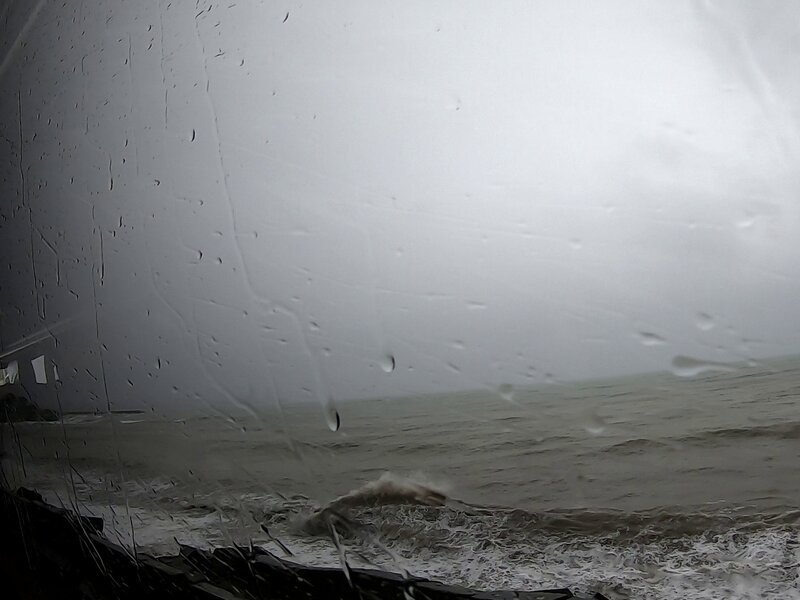
When I got through the crowded customs and came out on the Turkish side, it was already around five o’clock and the dramatic silver linings of the sun that laced the Black Sea had already disappeared. The sky was noticeably darker and looked eager to bring another round of rain. The sky wasn’t the only thing that changed. In the near distance was a tall and slender tower of a mosque piercing the clouds above. On this side of the border, there were mosques instead of churches, and they looked very different from the ones I had seen thus far. The writings on the signs were now in Turkish alphabet bearing its distinctive marks. Only the waves of the Black Sea were unchanged and gently continued to beat on the stony shoreline.
I was busy taking in all these details at first, but soon realized that the border crossing was bigger than I had thought, and that I couldn’t find my bus. I had assumed that the bus would be conveniently waiting for me right on the other side, but I didn’t recognize any of the people or the vehicles around. I walked down the busy road for a bit hoping to find anything resembling my bus. Fortunately, the bus turned out to be parked further down the road beside a mountain. Passengers whom I recognized were casually walking toward the bus. The attendant must have said something in Georgian about where to meet and I must have missed that.
The bus again hummed alongside the shores of the Black Sea as darkness fell. With dusk, the rain started picking up, and the waves became barely visible through the windows. When the sea was no longer discernible from the darkness, the bus stopped at a small town for a dinner break. I wasn’t really hungry, even though I had barely eaten anything for the whole day. Besides, I still had twenty more hours to go until reaching Istanbul and wanted to rule out any possibility of a toilet emergency. I just grabbed a simple sandwich and some snacks from a supermarket, figuring that experimenting with the local food would have to wait until I reached the destination. By late night, we reached the city of Samsun where most of the passengers got off and others got on. Only a few passengers were covering the entire distance to Istanbul. Sitting there, I had nothing to do for a while. I tried to read but couldn’t get through much because I was too exhausted and dizzy from not eating much. I closed my eyes and fell asleep to the drone of the engine drowning out the noise of heavy raindrops tapping on the side window.
At around eight o’clock the following morning, the bus pulled into a small town for breakfast. It must have rained all night. The sky was gray and nearby mountains were shrouded in the morning mist, as were the slim and pointy towers of the local mosques. Cars raced along the damp highway as their tires hissed against the grimy and wet pavement. I decided to skip breakfast because it was only going to be five or six more hours to Istanbul. I just stretched my legs, breathed in the fresh morning air, and headed back inside the bus when it became too chilly. The grandma sitting behind me, noticing that I didn’t have any breakfast, offered some snacks. “Would you like some sunflower seeds?” “Oh, thanks,” I replied and took a handful. “They are good for passing time,” she said, dryly. Her name was Ludmilla and she was headed to Montenegro where she lived. But she said that she was originally from Belgium. “Wait,” I asked, “how come you have a Slavic name?” “Well,” she said, “when I was born, there was a famous ballerina called Ludmilla. So people named girls after her.” When she asked why I was going to Istanbul, I just said that I was taking some time off work to travel. I was still a bit sleepy and didn’t want to get into the whole reason for wanting to reach Dublin, which I myself didn’t understand fully. For the next few hours, I fell in and out of sleep as the bus continued down the highway.
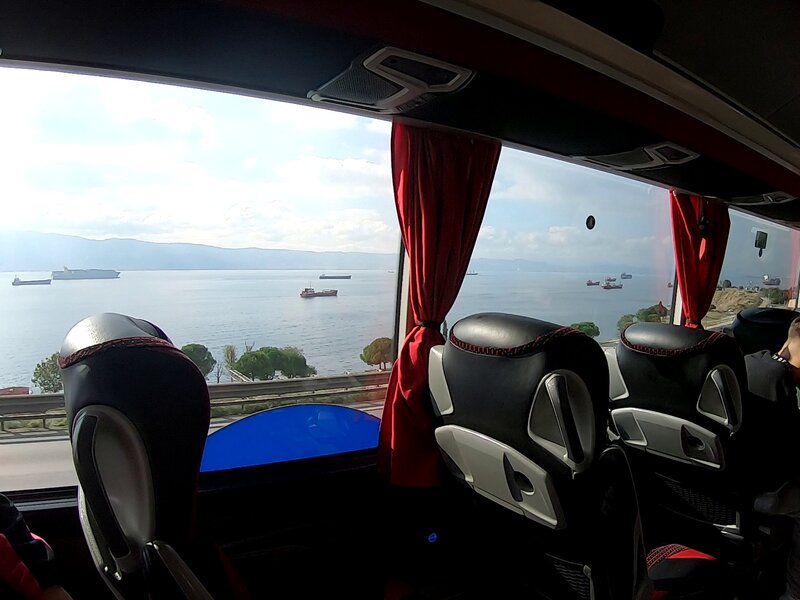
When I finally snapped back from dozing off, the sky was clear, as if the constant rain that had been falling since Georgia was nothing more than imagination. Out the window across the aisle, I could see countless container ships slowly sailing in the same direction in what looked like a giant lake or an inland sea. I hastened to check the map and found that the bus was merely around 100km (60mi) out of Istanbul. “Soon we will cross into the European side,” Ludmilla remarked as I intently observed everything that passed by the window. That interested me. I didn’t know where Asia was supposed to end and Europe was to begin, but reaching that geographic divide sounded like an important milestone which I didn’t want to miss. But the listless landscape and the warm autumn sky lulled me into a daze, and I slept through the whole thing.
On the European side, the densely populated urban streets outside the window suggested that the bus had reached the heart of Istanbul. With the daunting bus ride almost at the end, the thoughts about the next steps began to occupy my mind. On the off chance that she knew, I asked Ludmilla whether there was a good way to reach Dublin within the next few days. At first, she had some difficulty understanding the premise of having to reach Dublin via land in the next few days. I managed to explain that I was really going to Seattle for work and wanted to find my way to Dublin as a part of that trip. I wasn’t sure she really understood my peculiar reasons, but she gave me names of some bus companies and her contact in case I needed help. She gave me instructions about where my stop was, and hopped off before me, saying “Good luck.” The bus drove through downtown Istanbul for some more time and reached the terminus. I dragged myself outside the bus and, just like that, the mammoth bus ride that had once seemed impossible was done.
As soon as I got off the bus, I rushed to the Sirkeci station to book a train ticket toward Bulgaria. It wasn’t the time to celebrate my arrival yet. My goal of reaching Dublin in the next few days hinged on whether I could find a ticket to Bulgaria for the following day. Could I find a ticket with such short notice? I was going to find out soon enough at the station. I passed the famed Hagia Sophia and Blue Mosque on the way but my mind was too focused on the next steps to appreciate their beauty. Walking past the sea of visitors in those main areas only amplified my doubt about being able to find a ticket. Despite the hurry, I had to stop to grab a quick bite to eat on the way to the station. I hadn’t eaten anything proper since the Khinkali dinner in Tbilisi two days ago. After downing some shawarma, I nervously waded through the crowded streets and arrived at the Sirkeci station.
When I rushed to the ticket office, there was no one behind the window at first. But eventually a uniformed attendant showed up and waved me over. “Do you have a ticket to Dimitrovgrad for tomorrow?” I asked apprehensively through the holes in the window. “Just one?” the attendant asked back. It was hard to catch his voice among the hubbub of the crowds. “Yes,” I replied, pushing myself as close to the tiny openings on the glass as possible. “375 lira” ($10), the attendant replied in a dry tone. “So there is a ticket?” I tried to confirm, not believing what I was hearing. The attendant just nodded his head as if it was no big deal.
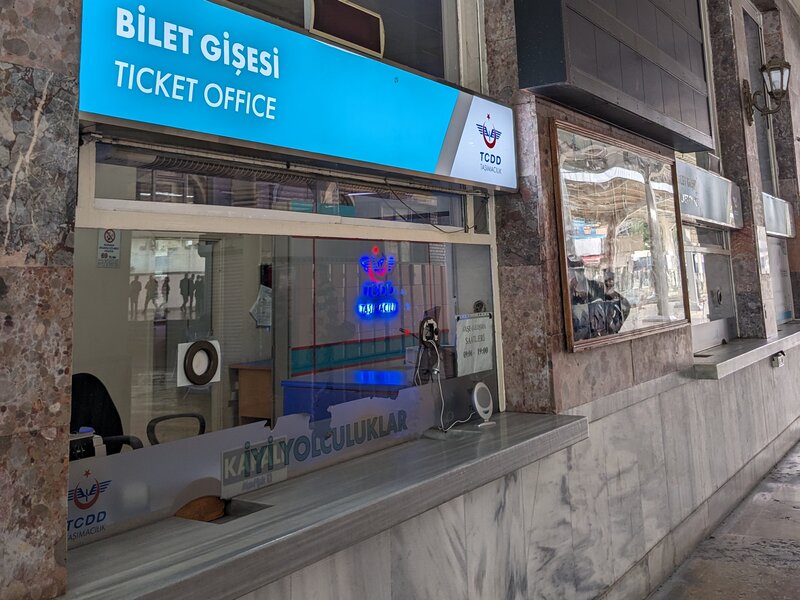
Dimitrovgrad was a Bulgarian town not far from the Turkish border, and was going to be my first stop after Istanbul. With a ticket to Dimitrovgrad in my hand, I dropped my backpack at a nearby hostel and set out to explore the city. I still needed to figure out what to do after Dimitrovgrad, because that wasn’t a huge city and I needed to keep on moving. My rough plan was to head straight to Bucharest from there and find the quickest connection bound for the west. But I couldn’t just sit around and keep planning, because it wasn’t like I had much time in Istanbul–the train to Dimitrovgrad was due to depart at 8:00PM the following day, and the time was already 3:00PM. So I decided to continue the planning in the evening and instead went out to the streets. I didn’t know where to go, but it sounded like a good idea to go back to the main area where I’d seen Hagia Sophia and Blue Mosque in passing. When I headed back there, they were still glowing in the afternoon sun while everyone else who filled the large square was busy taking pictures. They were just too perfect and beautiful, and you can guess who began to lose interest in them quickly. And when I found out the exorbitant entrance fee to all the magnificent landmarks in the area, I kind of lost the desire to keep hanging around.
Escaping what I had come to see as too perfect, I aimlessly walked down the narrow streets in the direction of the blue water that I saw further down the slope. It looked like a sea and some large ships were peacefully sailing on it. When I reached the water, I realized that it was the strait that separated the European and Asian parts of Istanbul. It must have led to the inland sea that I spotted through drowsy eyes as I woke up in the bus that morning. Across the blue water, the Asian side of Istanbul was now glowing in the orange color of the sunset. This made me realize that I really had reached Europe. The imaginary roads that I began to follow from far eastern Asia had brought me all the way there. The significance of arriving in Istanbul somehow escaped me before, because I was either too tired during the bus ride or too focused on getting a train ticket out of there. But at that moment, it began to hit me.
I just walked north along the coastline as the sun continued to set over the strait. Cats purred nearby as locals casually tried their luck with fishing lines cast into the evening sea. A group of birds flew freely in a formation while changing their direction in a big arc. The crimson glow of the sun gradually faded from the clouds that shrouded the other side of the water. Ships were the first to turn on their lights, one by one. Soon enough, small pinpoints of brightness began outlining the opposite shoreline. When the darkness descended all around, the water grew more wild and impatient, but many locals braved the nightfall by continuing to throw their fishing lines into the fierce sea.
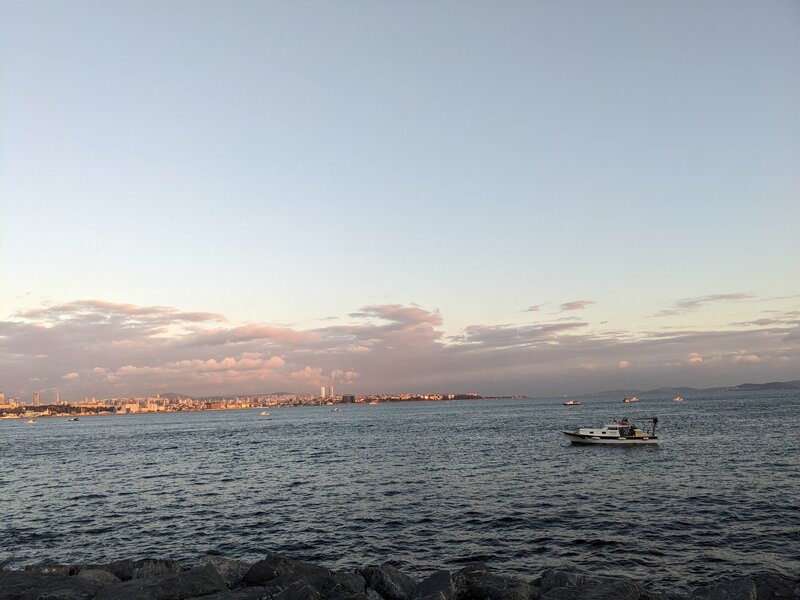
Another waterway joined the strait at the end of the coastline, and the night lights of the northern Istanbul were twinkling beyond its tumultuous water. There was a bridge across the water, so I walked to the other side where the nightlife happened to be in full swing. Narrow and hilly streets were full of shops, restaurants, and bustling crowds eager to take pictures of everything. It wasn’t too interesting, so I returned to the southern side and went back to the hostel. After the massive bus ride and a day of excursion, it felt good to have a shower and chill out for a while. In a corner of the rooftop bar, I spent some time coming up with a game plan for what should happen from this point on. The day was October 22nd, and I had to be in Seattle by October 28th. Since Dublin was eight hours ahead of Seattle, I could fly out of Dublin in the evening of 28th and still land in Seattle on the same day. But I had to be in Dublin ideally by the evening of 27th to have some buffer before the flight and also to explore Dublin. Since I was scheduled to arrive at Dimitrovgrad in the morning of October 24th, I was left with four full days to get to Dublin from there. I wasn’t sure whether it was enough.
While it wasn’t possible to plan the end-to-end route to Dublin, I managed to come up with the following idea that would at least get me to Budapest in around twenty-eight hours: first, I would go from Dimitrovgrad to Gorna, where I would change trains to go to the border town of Ruse. From Ruse, I would cross into Romania and reach Bucharest. From Bucharest, I would catch a train across the border to Budapest.
This was an overly ambitious plan because all the connecting trains were less than an hour apart. If any of the trains ran slightly off schedule, I could miss the connections. To make matters more complicated, the Bulgarian railway website wouldn’t allow me to book the tickets to Ruse due to some timetable changes. It didn’t say what the changes were. All in all, it seemed the best approach was simply to go and see what would happen. I was secretly nervous because I needed the plan to work–otherwise, all the effort of getting this far would have been for nothing. Even if the plan somehow magically worked, I had no idea how to cover the rest of the distance from Budapest to Dublin. I just had some vague idea of going to Brussels and catching a Eurostar train or a bus to London. The length of the train ride didn’t even register as an important factor. The only thing that mattered from here on was how much distance I could cover in a given time.
My endless thoughts were heading nowhere. I snapped back from them when some other guests invited me to a game of beer pong. It sounded like a good way to take my mind off things beyond my control. The beer pong itself was kind of lame because none of us were any good, and the cups were filled with tap water. One particular game dragged on so long with all of us constantly missing the cups. I think we all stuck around to the end for the sake of finishing the game. After the game, some more people joined and we kind of chilled and talked about random things and ideas that had never occurred to me in the tiny bubble in which I isolated myself back home. I returned to the dorm around midnight. Someone was snoring so loudly and I couldn’t fall asleep for a long time. Now all this, I thought, was the typical hostel experience I was used to.